Related Research Articles

Frankfort is the capital city of the U.S. state of Kentucky and the seat of Franklin County. It is a home rule-class city. The population was 28,602 at the 2020 United States census. Located along the Kentucky River, Frankfort is the principal city of the Frankfort, Kentucky Micropolitan Statistical Area, which includes all of Franklin and Anderson counties. It is the fourth smallest state capital city in the United States by population.

Robert Anderson was a United States Army officer during the American Civil War. He was the Union commander in the first battle of the American Civil War at Fort Sumter in April 1861 when the Confederates bombarded the fort and forced its surrender to start the war. Anderson was celebrated as a hero in the North and promoted to brigadier general and given command of Union forces in Kentucky. He was removed late in 1861 and reassigned to Rhode Island, before retiring from military service in 1863.
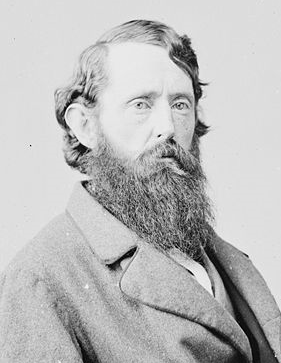
Benjamin Gratz Brown was an American politician. He was a U.S. Senator, the 20th Governor of Missouri, and the Liberal Republican and Democratic Party vice presidential candidate in the presidential election of 1872.

Frank Swett Black was an American newspaper editor, lawyer and politician. A Republican, he was a member of the United States House of Representatives from 1895 to 1897, and the 32nd governor of New York from 1897 to 1898.
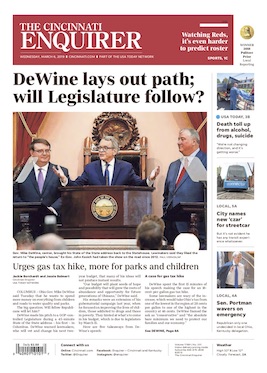
The Cincinnati Enquirer is a morning daily newspaper published by Gannett in Cincinnati, Ohio, United States. First published in 1841, the Enquirer is the last remaining daily newspaper in Greater Cincinnati and Northern Kentucky, although the daily Journal-News competes with the Enquirer in the northern suburbs. The Enquirer has the highest circulation of any print publication in the Cincinnati metropolitan area. A daily local edition for Northern Kentucky is published as The Kentucky Enquirer.
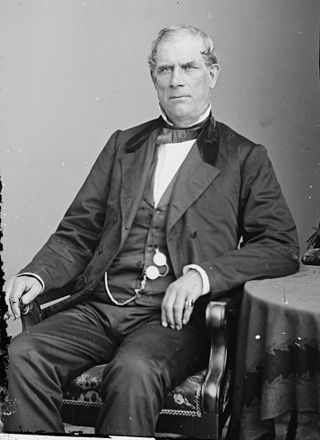
Edward Thurlow Weed was a printer, New York newspaper publisher, and Whig and Republican politician. He was the principal political advisor to prominent New York politician William H. Seward and was instrumental in the presidential nominations of William Henry Harrison (1840), Zachary Taylor (1848), and John C. Frémont (1856).

Gordon Granger was a career U.S. Army officer, and a Union general during the American Civil War, where he distinguished himself at the Battle of Chickamauga.
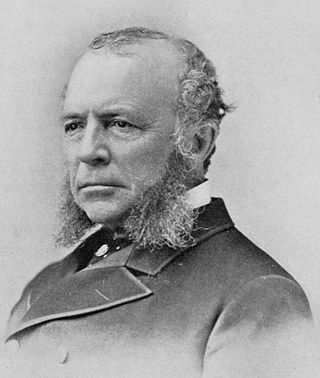
Edward John Phelps was a lawyer and diplomat from Vermont. He is notable for his service as Envoy to Court of St. James's from 1885 to 1889. In addition, Phelps was a founder of the American Bar Association, and served as its president from 1880 to 1881.

Amos Kendall was an American lawyer, journalist and politician. He rose to prominence as editor-in-chief of the Argus of Western America, an influential newspaper in Frankfort, the capital of the U.S. state of Kentucky. He used his newspaper, writing skills, and extensive political contacts to build the Democratic Party into a national political power.

Martin D. Hardin was a politician and lawyer from Kentucky. Born in Pennsylvania, his family immigrated to Kentucky when he was still young. He studied law under George Nicholas and commenced practice at Richmond, Kentucky. His cousin, future U.S. Representative Benjamin Hardin, studied in his law office. He represented Madison County in the Kentucky House of Representatives for a single term.

The Kentucky Historical Society (KHS) was originally established in 1836 as a private organization. It is an agency of the Kentucky state government that records and preserves important historical documents, buildings, and artifacts of Kentucky's past. The KHS history campus, located in downtown Frankfort, Kentucky, includes the Thomas D. Clark Center for Kentucky History, the Old State Capitol, and the Kentucky Military History Museum at the State Arsenal. KHS is a part of the Kentucky Tourism-Arts and Heritage Cabinet, is fully accredited by the American Alliance of Museums, is a Smithsonian affiliate, and endorses the History Relevance statement. The mission of the KHS is to educate and engage the public through Kentucky’s history in order to confront the challenges of the future. The KHS allows the public access to their resources through the online Library catalog along with the in-person Library.

The Beauchamp–Sharp Tragedy was the murder of Kentucky legislator Solomon P. Sharp by Jereboam O. Beauchamp. As a young lawyer, Beauchamp had been an admirer of Sharp until Sharp allegedly fathered an illegitimate child with Anna Cooke, a planter's daughter. Sharp denied paternity of the stillborn child. Later, Beauchamp began a relationship with Cooke, who agreed to marry him on the condition that he kill Sharp to avenge her honor. Beauchamp and Cooke married in June 1824, and in the early morning of November 7, 1825, Beauchamp murdered Sharp at Sharp's home in Frankfort.

Lincoln's "Lost Speech" was a speech given by Abraham Lincoln at the Bloomington Convention on May 29, 1856, in Bloomington, Illinois. Traditionally regarded as lost because it was so engaging that reporters neglected to take notes, the speech is believed to have been an impassioned condemnation of slavery.
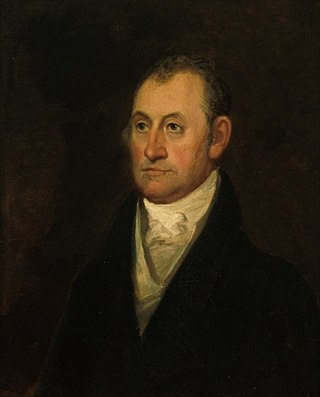
Thomas Todd was an Associate Justice of the Supreme Court of the United States from 1807 to 1826. Raised in the Colony of Virginia, he studied law and later participated in the founding of Kentucky, where he served as a clerk, judge, and justice. He was married twice and had a total of eight children. Todd joined the U.S. Supreme Court in 1807 and his handful of legal opinions there mostly concerned land claims. He was labeled the most insignificant U.S. Supreme Court justice by Frank H. Easterbrook in The Most Insignificant Justice: Further Evidence, 50 U. Chi. L. Rev. 481 (1983).
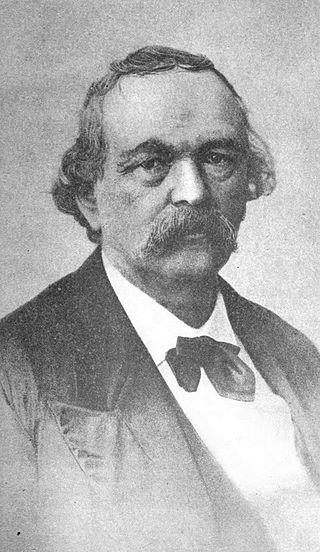
Albert Taylor Bledsoe was an American Episcopal priest, attorney, professor of mathematics, and officer in the Confederate army and was best known as a staunch defender of slavery and, after the South lost the American Civil War, an architect of the Lost Cause. He was the author of Liberty and Slavery (1856), "the most extensive philosophical treatment of slavery ever produced by a Southern academic", which defended slavery laws as ensuring proper societal order.

Colonel Edmund Dick Taylor was an American businessman, politician, and soldier from Illinois. He is remembered as the first person to suggest that the United States should issue paper currency ("greenbacks") during the American Civil War.
James Russell Vineyard was an American Democratic politician and pioneer. He served in the California State Senate and Assembly, and earlier was a member of the Wisconsin State Assembly, the legislature of the Wisconsin Territory and the 7th Michigan Territorial Council. He was infamous for shooting and killing fellow Wisconsin territorial legislator Charles C. P. Arndt on the floor of the legislature.

William Franklin Switzler was an American lawyer, journalist, publisher, and historian from Columbia, Missouri.
The 1934 Kentucky State Thorobreds football team was an American football team that represented Kentucky State Industrial College as a member of the Midwest Athletic Association (MAA) during the 1934 college football season. In their fourth season under head coach Henry Kean, the team compiled an 8–0 record, won the MAA championship, shut out seven of eight opponents, and outscored all opponents by a total of 193 to 2. The team was recognized as the black college national champion. The team played its home games at Alumni Field in Frankfort, Kentucky. Notable players included Joe "Tarzan" Kendall, an inductee of the College Football Hall of Fame.
Isaac Van Anden was an American newspaper publisher and founder of the Brooklyn Eagle.
References
- ↑ "The Argus of western America". Library of Congress.
- ↑ National Endowment for the Humanities. "The Argus of western America. [volume]" – via chroniclingamerica.loc.gov.
- ↑ "How Politicians Bought the 19th Century Media". May 4, 2015.[ permanent dead link ]
- ↑ "The Argus of western America". searchworks.stanford.edu. Retrieved 2019-11-24.
- ↑ "Deed of emancipation between Moses O. Bledsoe and [Taylor] Gibson, St. Louis, Missouri, 7 March 1836 :: Manuscripts". kyhistory.com.
- ↑ Society, American Antiquarian (November 24, 1914). "Proceedings of the American Antiquarian Society". American Antiquarian Society. – via Google Books.
- ↑ "Journal of the Senate of the Commonwealth of Kentucky". November 24, 1818 – via Google Books.
- ↑ Burlingame, Michael (April 1, 2013). Abraham Lincoln: A Life. JHU Press. ISBN 9781421410678 – via Google Books.